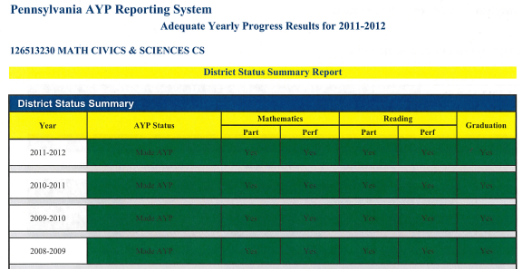Yes, PASSED - Annual Yearly Progress (AYP)!

Why Adequate Yearly Progress?
Adequate Yearly Progress (AYP), as part of the federal No Child Left Behind Act (NCLB), holds LEAs accountable to students, their parents, teachers, and the community. The purpose of AYP is to ensure that all students have reading and math skills that prepare them for the future. The law states that all students must reach the Proficient level or higher in Reading or Language Arts and Mathematics by 2014. School districts and schools must show Adequate Yearly Progress on several measurable indicators: Attendance or Graduation Rate, Academic Performance, and Test Participation.AYP measures determine whether a school or district is making sufficient annual progress towards the goal of 100% proficiency.
A school that misses only one measure will not meet AYP—but this does not mean it is a failing school. Rather, AYP indicates to school leadership that areas of opportunity exist. AYP can also identify schools with persistent and pervasive problems. Measuring AYP can prompt schools that consistently miss measures to make drastic improvements. While these improvements are being made, options are available to students, from tutoring to school choice.
At the district level, performance and participation are assessed in three grade spans: Grades 3–5, 6–8, and 9–12. To meet Academic Performance or Test Participation measures for AYP, the district needs to meet the goal/target for both subjects in one grade span only.
What does Adequate Yearly Progress Measure?
AYP measures student results for three indicators, as illustrated–Attendance (for schools without a High School graduating class) or Graduation Rate (for schools with a High School graduating class); Academic Performance; and Test Participation. The details of AYP measurement can be complicated.AYP requires that all groups of children reach proficiency in Reading or Language Arts and Mathematics – hence the phrase "no child left behind". These groups include all racial and ethnic backgrounds, students who are English Language Learners, economically disadvantaged students, and special education students. (When these subgroups contain fewer than 40 students, the subgroup is not separately evaluated for AYP).
States determine AYP performance based on students' standardized test scores each year. The Pennsylvania Department of Education (PDE) uses the Pennsylvania System of School Assessment (PSSA) to determine AYP performance. Participation in and performance on the PSSA, the PSSA-M (modified), and the PASA are cornerstones of measuring AYP results. As measured by the PSSA, students' scores fall into one of four performance levels:
- Advanced (highest)
- Proficient
- Basic
- Below Basic (lowest)







